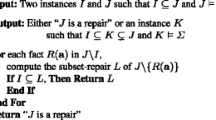Abstract
This paper focuses on the problem of answering queries addressed to a group of databases which share a common set of rules (deductive rules or integrity constraints). We assume that the databases are sets of clauses consistent with the rules. However, accessing them altogether may lead to contradictions.
We allow the user who queries the group of databases to specify, in his/her queries, an order between the databases he/she wants to access. This order is supposed to express the relative reliability between the databases. In the context of our work, we can guarantee that the answers the user will get, will not be contradictory.
The paper describes the axiomatics of a logic for reasoning with information provided by several databases which can be contradictory. It also presents a query-evaluator based on this logic. This evaluator is described as a meta-interpreter of PROLOG. We prove that, under some non-recursivity condition, this evaluator provides correct answers, in regard to the ones characterized by the logic.
This evaluator is flexible in the sense that it allows the user to ask hypothetical queries of the form: assuming that the relative reliability of some databases is given by such an order, is such a condition true? and also, hypothetical queries of the form: assuming that the relative reliability of some databases is given by such an order, what are the individuals which satisfy such a condition?
Access this chapter
Tax calculation will be finalised at checkout
Purchases are for personal use only
Preview
Unable to display preview. Download preview PDF.
Similar content being viewed by others
References
[Baral & al, S1991]_C. Baral, S. Kraus, J. Minker, and V.S. Subrahmanian. Combining multiple knowledge bases. IEEE Trans. on Knowledge and Data Engineering, 3(2), 1991.
[Baral & al, S1992]_C. Baral, S. Kraus, J. Minker, and V.S. Subrahmanian. Combining knowledge bases consisting of first order theories. Computational Intelligence, 8(1), 1992.
B. F. Chellas. Modal Logic, an introduction. Cambridge University Press, 1980.
L. Cholvy and R. Demolombe. Reasoning with information sources ordered by topics. In Proceedings of Artificial Intelligence: Methods, Systems and Applications (AIMSA). World Scientific, Sofia, September 1994.
L. Cholvy. Proving theorems in a multi-sources environment. In Proceedings of IJCAI, pages 66–71, 1993.
L. Cholvy. Fusion de sources d’informations contradictoires ordonnées en fonction des thèmes. Revue de l’Intelligence artificielle, 8(2), 1994.
L. Cholvy. A logical approach to multi-sources reasoning. In Lecture notes in Artificial Intelligence, number 808. Springer-Verlag, 1994.
L. G. Demichiel. Resolving database incompatibility: an approach to performing relational operations over mismatched domains. IEEE Transactions on Knowledge and Data Engineering, 1(4), 1989.
[Fagin & al, 1986]_R. Fagin, G. Kupper, J. Ullman, and M. Vardi. Updating logical databases. Advances in Computing Research, 3, 1986.
[Fagin & al, 1983]_R. Fagin, J.D. Ullman, and M. Vardi. On the semantics of updates in databases. In ACM TODS, pages 352–365, 1983.
G. E. Hughes and M. J. Cresswell. An introduction to modal logic. Methren London and New York, 1972.
P. Gärdenfors. Knowledge in Flux: Modeling the Dynamics of Epistemic States. The MIT Press, 1988.
H. Katsuno and A. Mendelzon. Propositional knowledge base revision and minimal change. Artificial Intelligence, 52, 1991.
A. Motro. A formal framework for integrating inconsistent answers from multiple information sources. Technical Report ISSE-TR-93–106, George Mason University, 1993.
B. Nebel. A knowledge level analysis of belief revision. In Proc of KR’89, 1989.
R. Reiter. On closed world databases. In Logic and data Bases, Plenum Press New-York, 1978.
M. Siegel and S. E. Madnick. A metadata approach to resolving semantic conflicts. In Proceedings of VLDB, pages 133–146, 1991.
Author information
Authors and Affiliations
Editor information
Editors and Affiliations
Rights and permissions
Copyright information
© 1997 Springer Science+Business Media New York
About this chapter
Cite this chapter
Cholvy, L. (1997). Flexible Query-Answering in a Group of Databases. In: Andreasen, T., Christiansen, H., Larsen, H.L. (eds) Flexible Query Answering Systems. Springer, Boston, MA. https://doi.org/10.1007/978-1-4615-6075-3_8
Download citation
DOI: https://doi.org/10.1007/978-1-4615-6075-3_8
Publisher Name: Springer, Boston, MA
Print ISBN: 978-1-4613-7783-2
Online ISBN: 978-1-4615-6075-3
eBook Packages: Springer Book Archive




